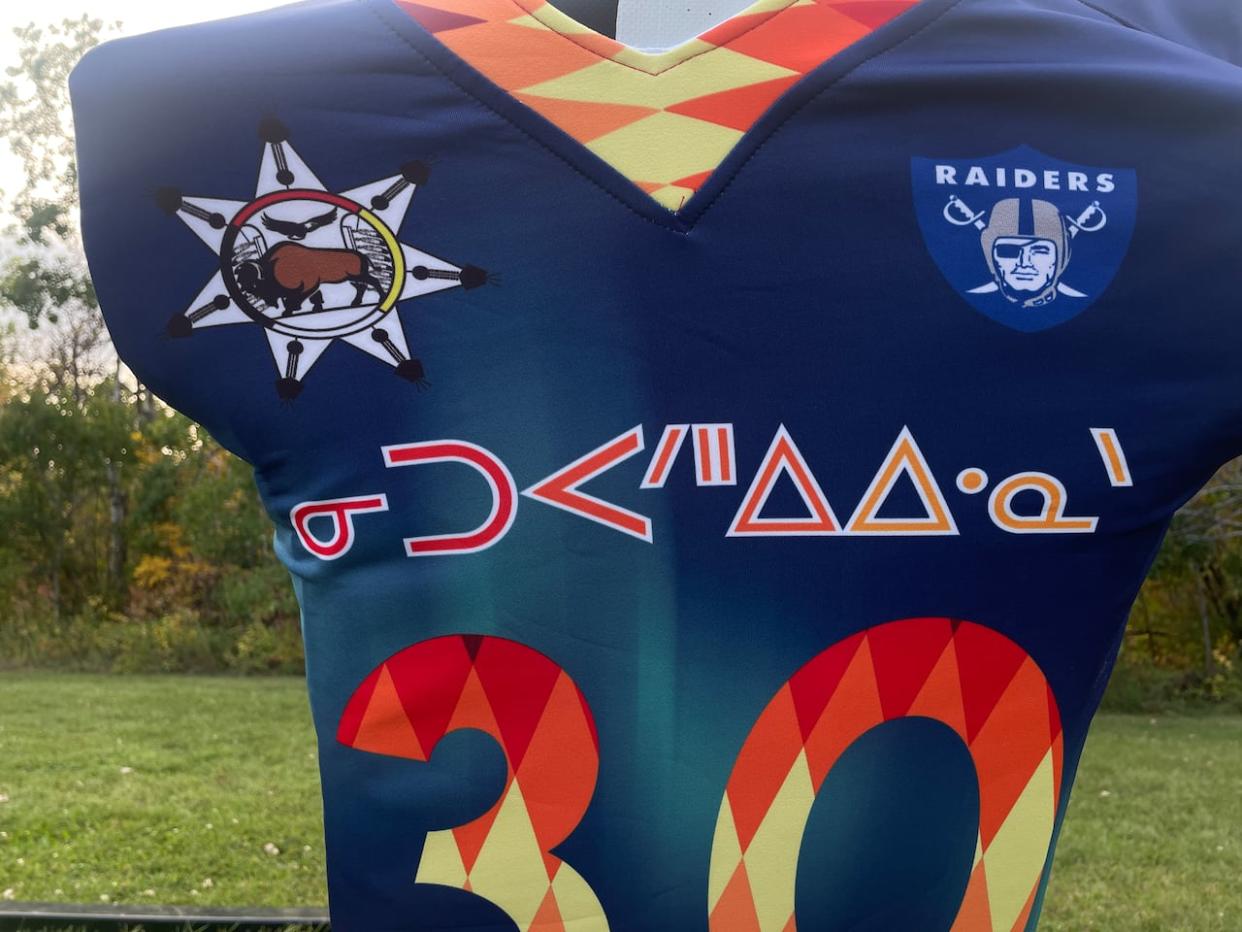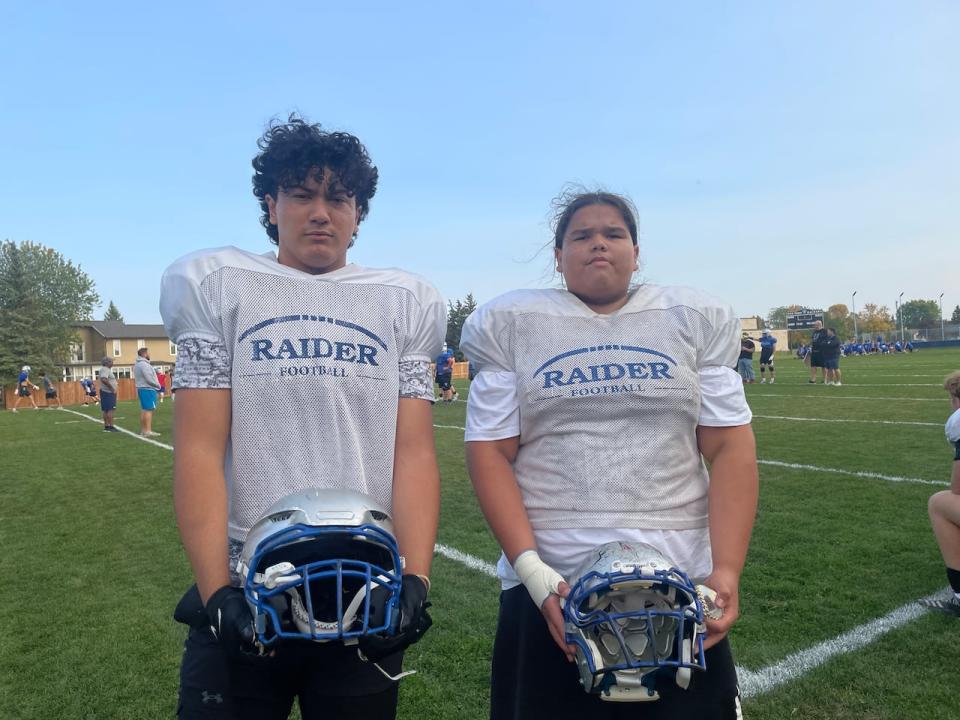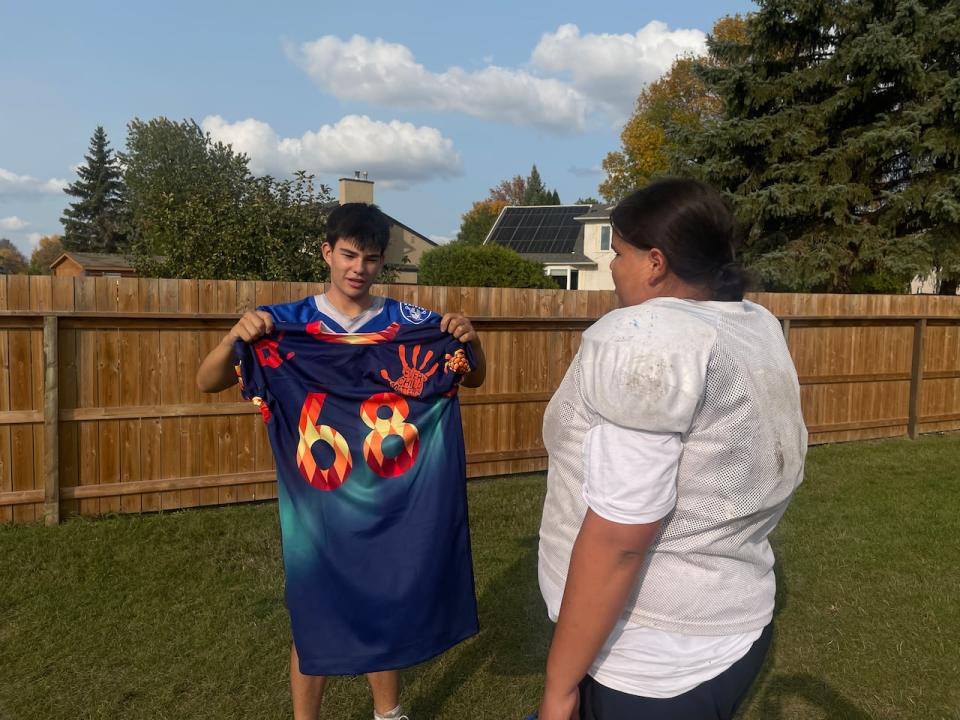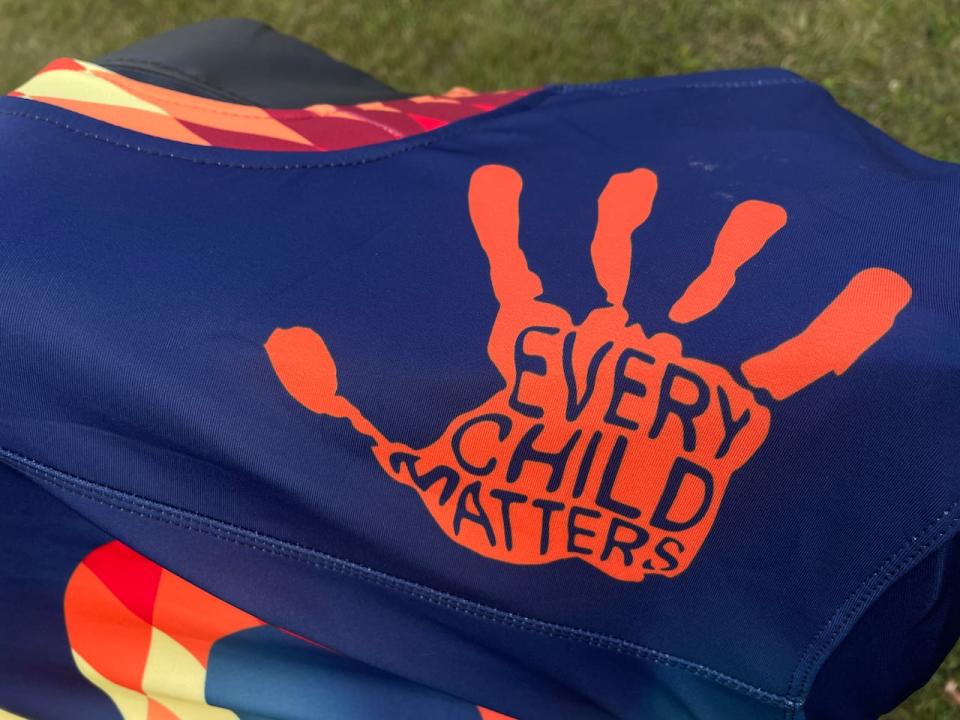Indigenous players design reconciliation jerseys for Winnipeg high school team

When the Oak Park Raiders kick off their football game on Friday afternoon, they'll be wearing special Truth and Reconciliation jerseys laden with imagery and infused with pride.
"It's been a little bit more emotional than I would have thought at first. It's a big deal," said coach Chris Ollson, whose squad will debut the jerseys the day before National Day for Truth and Reconciliation.
"It's not that long ago that wearing these colours and wearing these pictures on a uniform would not have been allowed. It really puts it home that this is something bigger than maybe we thought we were doing originally."
The idea for the uniform sprouted two years ago, when Ollson asked player Dawson Andrews, who is from Dakota Tipi First Nation, if his dad would like to give a pre-game speech to the team and then perform the coin toss at what they've named the Truth and Reconciliation game.
Andrews' dad is the chief of Dakota Tipi, which is west of Winnipeg, next to Portage la Prairie.
Last year, Andrews approached Ollson with an idea to create a special sticker for the Winnipeg high school team's helmets. That led to a conversation and bigger ideas.

Dawson Andrews, left, and Rocco Linklater came up with the designs for the special reconciliation jersey. (Submitted by James Loewen)
"We started drawing some stuff out on the white board … [and] it kind of snowballed into this beautiful uniform that we've got now," Ollson said.
Once the decision was made to go full out and create a jersey, Andrews, 17, recruited his D-line teammate Rocco Linklater, who is from Nisichawayasihk Cree Nation in Nelson House.
"It was an amazing experience to collab with other Indigenous youth for these jerseys," Andrews said.
Linklater came up with the idea of using Cree syllabics to spell out the Raiders name, Andrews said.
"We got them in a couple days ago, and they're amazing to look at, they're amazing to see. I don't think I've ever seen a jersey that has Indigenous representation in a high school league," Andrews said.
"It's an amazing feeling to be one of the first schools to be doing it."
The jerseys haven't been worn yet, but they're already receiving rave reviews.
"The whole Indigenous community at my rez has heard about these jerseys, and they all want their own, because that's how shocking it is for them to see something like this," Andrews said.
"They're all saying how proud they are of me, and I'm sure it's going the same for Rocco."
The jerseys are styled with various elements, such as a red hand print on one shoulder to represent MMIWG, and an orange hand print on the other shoulder for Every Child Matters, a phrase associated with Truth and Reconciliation Day.
One sleeve has an orange turtle, representing safety and protection. On the other sleeve is a bison skull, representing power and strength. The numbers are designed in a star blanket pattern with various shades of orange.
The colours honour Phyllis Webstad who, in 1973 at the age of six, was stripped of her new orange shirt on her first day at a residential school in British Columbia. National Day for Truth and Reconciliation is also known as Orange Shirt Day — a day to remember what happened to First Nations students at residential schools across Canada.

A teammate holds up the special reconciliation jersey for Rocco Linklater, right, to see for the first time. (Submitted by James Loewen)
"We're all going to play our hardest to represent these new jerseys, to show how hard we all fight for reconciliation at our school," Andrews said.
The jerseys were funded by Andrews' dad, so a Dakota Tipi patch acknowledges that support.
The northern lights are also represented in a ghostly wash across the numbers. Ollson calls it "a faint homage to our ancestors … and to the alumni of our program as well."
Of the four biggest high schools in the Pembina Trails School Division, Oak Park has the highest percentage of individuals who identify as Indigenous, said Ollson, who hopes the jerseys encourage other school sports teams "to get involved in a similar fashion."
Oak Park's football program has a rich history, with several alumni who have gone on to play professionally. Two of them, Nic Demski and Brady Oliveira, are currently with the Winnipeg Blue Bombers. Former Bomber Andrew Harris is now with Toronto.
But to Ollson, the initiative being shown by Andrews and Linklater is a far greater success story.
"Them representing the program, their school and the community in a positive light, that's the best stuff to see," he said.
To the disappointment of players who wanted to have them as keepsakes, the reconciliation uniforms will be kept by the school to be used annually, Ollson said.
"We want to make this a tradition, that we're doing this when Dawson and Rocco are on to bigger and better things in life — that we're still representing and wearing these jerseys and bringing a positive light for Indigenous youth."
Andrews, who is in Grade 12, hopes to to take Indigenous business studies at the University of Manitoba.
"So that after I'm done in university I can go out and help and support Indigenous businesses, help them grow. I really want to come back and help my people and my community," he said.

A close-up shows one of the shoulders on an Oak Park reconciliation jersey. (Submitted by James Loewen)
He plans to return to the school to watch those jerseys in reconciliation games down the road.
"I'm totally going to come back as an alumni … because this program saved my life, pretty much," he said.
He lost his older brother to an overdose a few years ago and went into a dark place, he explained.
"I had nowhere to look forward to."
Former Oak Park coach Stu Nixon reached out to him about joining the football team "and it just went into this big part of my life," Andrews said.
"I don't know where I would be right now without this football program. It will forever be a part of my life."


